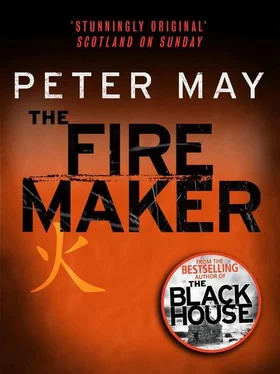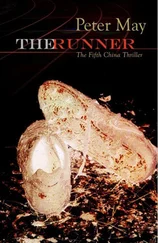‘We have a suspected suicide, but there are problems with identification. The victim set fire to himself, and the autopsy is, I think, a little specialised. He is very badly burned.’
‘And you want me to do an autopsy,’ she realised. ‘Well, of course. I’d be only too happy to help.’
He relaxed immediately and beamed again. But she was already thinking how she might turn this to her advantage. You’re going to have to start getting yourself a little guanxi in the bank , Bob had said. A window of opportunity was opening up for her students to observe an autopsy — without the help of Mr Cao. Not the burn victim, perhaps. But that particular corpse would put some guanxi in the bank for later.
Mr Chen took her arm and ushered her out into the corridor. ‘I am so very pleased you agree to do me this favour,’ he said.
She was a little taken aback. ‘What, you want me to do it now?’
‘No, no. I want you to come and meet my deputy. He is with Professor Jiang. I have, of course, already asked Professor Jiang for permission to ask you.’
And the professor, Margaret thought, was probably glad to get her out of his hair for a while. In fact, when Professor Jiang rose from behind his desk as they knocked and entered his office, she felt that his smile lacked a little in warmth. He looked at Chen. ‘Well?’
‘Dr Campbell has agreed, of course.’
Jiang seemed relieved, and Chen turned to a younger man who had been sitting by the window. ‘My deputy, Li Yan,’ he said. ‘He is in charge of the case.’ And as Li stood up Margaret realised who he was.
Li hurried to keep up as Chen strode across campus to where they’d parked their car in the shade of some trees. Chen was furious. ‘What do you mean “not necessary”?’ he barked.
Li tried to be reasonable. ‘The pathologist at the Centre of Material Evidence Determination will not be pleased. It will be a loss of face for some American to be brought in.’
‘You didn’t think so when I first suggested it.’
‘I didn’t know who it was then.’
‘And just what do you have against this woman? She is a recognised expert in her field.’
‘I realise that, Chief. It’s just…’
But Chen cut him off. ‘And do you not think I will lose face if suddenly I turn around and tell her we’ve changed our minds? It’s out of the question. I have asked. She has agreed. And that’s an end to it.’ He climbed into the driver’s seat, slammed the door shut, started the engine and drove off with an impetuous squeal of tyres.
The sky was lost in a dazzling wash of haze and dust. The diffused glare of the sun reflected back from every surface, and the world seemed burned out, like an overexposed photograph. Margaret slipped sunglasses over her eyes to bring back definition, and hurried to keep pace with Lily on the long walk from the administration block, past the playing fields, to the squat, four-storey concrete building at the far end which housed the Centre of Material Evidence Determination. Her spirits were high for the first time since her arrival in China, lifted in large part by the look on Deputy Section Chief Li’s face when she had walked into Professor Jiang’s office with Mr Chen. All his irritated superiority of the previous day had been replaced first by astonishment, and then dismay. His handshake had been cursory, his eyes distant. He had said almost nothing. Enough, and no more, to remain polite. And now he would be waiting for her impatiently in an autopsy room, the stink of disinfectant and formaldehyde wrinkling his nose. They were the perfumes of her profession, an olfactory sensation so often experienced it no longer registered — except as something familiar, almost comforting. But not to Li, she was sure.
In fact there were five metal autopsy tables in the room, with gutters and reservoirs perfectly placed to collect blood and other fluids draining from the bodies during dissection. Li stood stiffly by the door making desultory conversation with a pathologist in a white gown. Both turned as Margaret entered with Lily.
‘Dr Campbell, Professor Xie.’ Li made the bleak introduction. There was no warmth in either hand or eye as Professor Xie shook her hand. Margaret understood immediately that the professor had lost face, being made to play second fiddle not only to an American, but to a woman. She was, she realised, beginning to learn something about the psychology of the Chinese. She decided not to indulge in appeasement for the moment. She turned to Lily.
‘No need for you to hang around, Lily.’
‘No, I stay in case there be anything you need, Doctah Cambo.’ Lily was determined not to miss out on this moment between Margaret and Li, especially after what had passed between them yesterday afternoon.
‘Actually,’ Margaret said acidly, ‘there is some photocopying I was wanting done.’
‘All taken care of, Doctah,’ Lily replied, quite unfazed.
Margaret turned to Li. ‘So — you have no idea who the victim is?’ she asked.
‘No,’ Li said. ‘We will have to wait and match dental records with missing-persons reports as they come in. It could take some weeks.’
‘Weeks?’ She was astonished.
He took her tone as criticism. ‘Time is unimportant. Results are.’
‘In the States both are.’
‘Yes, but in China we pride ourselves on getting things right.’
She bit her tongue. After all, she had no ammunition with which to fight back. The Chinese might make studies of well-known cases in the US, but Americans were profoundly ignorant of headline crimes in China.
‘I was once involved in a murder investigation that lasted more than two years,’ Li went on, to illustrate his point. ‘A family were found slaughtered in their home. A mother, father, grandfather, child. There was a forced entry, a night-time burglary we believed had gone wrong. Blood everywhere. Footprints in blood, fingerprints. But our national fingerprint register is, as yet, limited. We had to trace and interview nearly three thousand migrant workers known to have been in the area at the time.’
Margaret interrupted. ‘How did you know it was a migrant worker?’
‘In China,’ Li said, ‘people respect the police. They know it is their duty to help the police. If they have a job, their danwei provides their apartment, pays for their medical treatment. Someone on their street committee will know if they are at home or not at home. There is a network of information about people’s lives and movements that we can call on. We call it the masses line. The masses line is the single biggest reason for low crime figures in China. People do not commit crime if they know they will be caught. And if they are caught they lose everything — job, house, medical treatment, pension…’ He shook his head and scuffed his foot on the floor. ‘Everyone agrees, economic reform in China is good. Deng Xiaoping said: “To be rich is glorious.” But now the iron rice bowl is broken…’
‘Iron rice bowl?’
He seemed annoyed by the interruption. ‘Job for life. We call it the iron rice bowl. Now that the rice bowl is broken, there are many unemployed people. Many workers are itinerant. They move about the country looking for work. They are what we call the floating population. And as the floating population grows, so does the crime rate.’
Margaret nodded, beginning to understand just how such fundamental differences in a society can affect its criminal activity. ‘So you went after your three thousand itinerant workers.’
‘We found eleven had gone missing. One by one they had to be found and eliminated from our inquiry. Finally we got our man.’
‘Two years?’
Читать дальше












